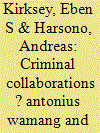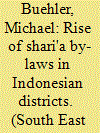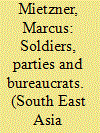| Srl | Item |
| 1 |
ID:
083120


|
|
|
|
|
| Publication |
2008.
|
| Summary/Abstract |
US intelligence reports linked the Indonesian military to the August 2002 murder of two American schoolteachers and an Indonesian in Timika, Papua province. Restrictions on the US Foreign Military Financing (FMF) and International Military Education and Training (IMET) for Indonesia came to be linked to the investigation of this murder. However, a Jakarta court subsequently sentenced a Papuan villager, Antonius Wamang, to life in prison for leading the attack. Six other villagers were given sentences ranging from five to eight years. The same day that Wamang was sentenced, Pentagon officials announced a 'new era of military cooperation' with Indonesia. Yet many irregularities were not resolved during the trial. Questions remain about whether Wamang's group acted alone. Did Indonesian military agents help Wamang stage the attack? Did Bush Administration officials help cover up evidence of Indonesian military involvement so that they could pursue objectives in the war on terror? The idiom of co-production offers insight into ambivalent and contingent collaborations that develop during covert operations and acts of terrorism.
|
|
|
|
|
|
|
|
|
|
|
|
|
|
|
|
| 2 |
ID:
083121


|
|
|
|
|
| Publication |
2008.
|
| Summary/Abstract |
Soeharto used the Indonesian bureaucracy to generate rents that could be harvested by 'insider' firms, while also encouraging it to extort money from 'outsider' firms and individuals. This necessitated incentives that would ensure strong loyalty and minimize internal opposition. Government entities were provided with insufficient budget funding to cover their costs, and their officials were expected to generate cash from illegal activities, making public sector employees financially dependent on corruption. Any employee who opposed this system could expect to be restricted to earning no more than the pitifully low formal salary entitlement. The system therefore became strongly self-reinforcing.
|
|
|
|
|
|
|
|
|
|
|
|
|
|
|
|
| 3 |
ID:
083123


|
|
|
|
|
| Publication |
2008.
|
| Summary/Abstract |
A rising number of districts in Indonesia have adopted shari'a by-laws in recent years. This article shows that this development has to be situated in the context of institutional change. Shari'a by-laws allow regents to open up new revenue streams. These revenues are then used to consolidate political power
|
|
|
|
|
|
|
|
|
|
|
|
|
|
|
|
| 4 |
ID:
083122


|
|
|
|
|
| Publication |
2008.
|
| Summary/Abstract |
This article discusses illicit fund-raising efforts in Indonesia's armed forces, political parties and bureaucracy after the fall of Suharto in 1998. It argues that while personal self-enrichment remains a key motivation for military leaders, party politicians and bureaucrats to collect off-budget funds, there are also other crucial factors. Most importantly, all three sectors aim to control independent funds in order to maintain or strengthen their autonomy from other state institutions, such as parliamentary budget commissions, executive monitoring bodies or official auditing boards. By engaging in extensive self-financing practices, however, the three political actors undermine their own professionalism, functional effectiveness and internal coherence, and obstruct Indonesia's process of democratic consolidation
|
|
|
|
|
|
|
|
|
|
|
|
|
|
|
|
| 5 |
ID:
083119


|
|
|